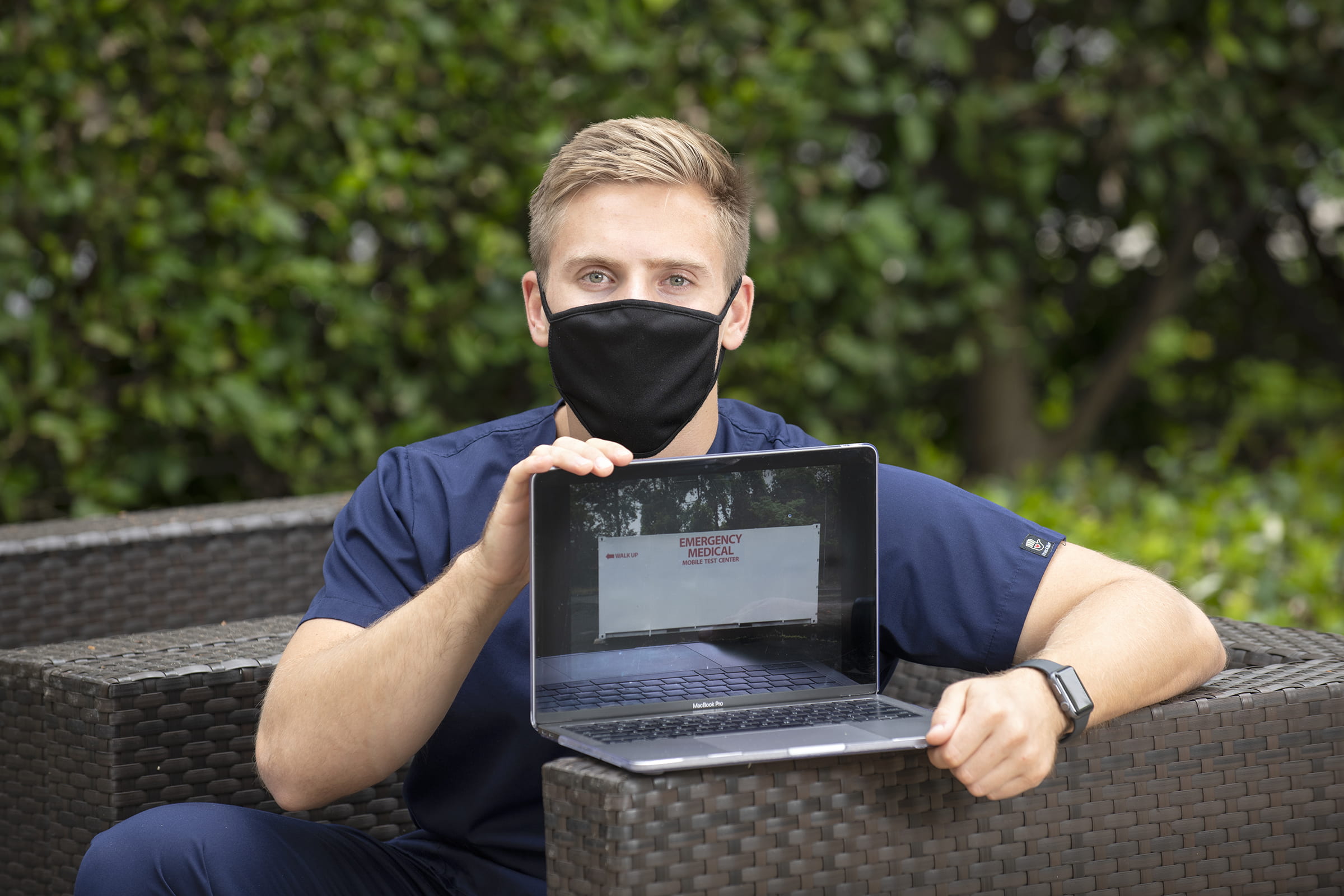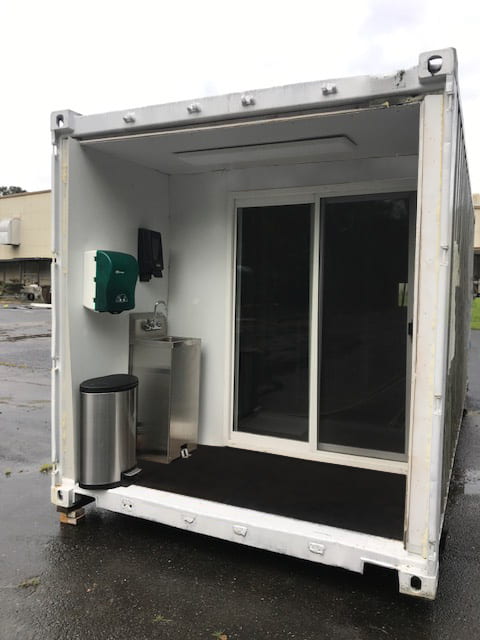Thinking outside the box
UCI infectious diseases researcher teams up with father to convert shipping container into prototype for mobile, drive-thru COVID-19 testing centers

The son had an idea. His father was all in.
It occurred to Chase Berman, 24, an infectious diseases researcher in the laboratory of Dr. Susan Huang – UCI Health’s medical director of epidemiology and infection prevention – back in late March that mobile testing labs for COVID-19 would be needed should a surge in cases happen.
So he called his father, Chris Berman, 63, a former Navy SEAL who has the particular skills to build them. Since 2004, he’s been manufacturing armored vehicles for the military and converting shipping containers for other functions, including as mobile kitchens for troops, through his privately held company, Granite Tactical Vehicles, based in Mount Airy, North Carolina.
“Hey, Dad,” the younger Berman said on the phone, “you’re great at repurposing shipping containers into useful products. Let’s try to do something to help out during this pandemic by making drive-thru COVID-19 testing units.”
“Sure,” Chris Berman responded. “Let’s build something!”
Chase Berman, who in addition to his clinical research is involved in COVID-19 outbreak prevention in Orange County nursing homes, had some ideas about how to make the mobile unit as safe and efficient as possible for workers and the public.
His father had the engineering smarts to craft what is now a prototype they call the Mobile Pathogen Testing Unit. It can be transported via a flatbed trailer but needs to be on the ground for drive-thru testing so healthcare personnel are at the same height as people in cars.
“My dad didn’t go to school to study engineering,” Chase Berman says. “But he’s an incredible engineer. He just thinks of things, and he’s able to make them.”
He sent his father sketches of how he thought the unit should be designed and equipped. After several rounds of tweaking, the two believe they have a winner and say they’re prepared to mass-produce them if there’s a COVID-19 surge this fall.
The 20-foot MPTU can accommodate as many as four individuals inside. It has both drive-thru and walk-up windows with a canopy that extends 4 feet for bad weather.

“Our design focuses on reducing contact among healthcare workers [as well as with the public] and also reducing the need for them to walk in and out of a unit repeatedly during a shift,” Chase Berman says.
Accordingly, the MPTU has two slots in the wall – think of the post office – for regular and COVID-19-related trash. A person inside the unit puts waste through the appropriate slot, and it slides into containers outside.
A full Plexiglas barrier shields workers from those being tested, reducing the need for personal protective equipment.
“I had to make a lot of changes at the beginning because I would do something and Chase would be like, ‘Nope, we can’t do that,’” Chris Berman says.
For example, he didn’t initially include a hand-washing station in the restroom.
“I was all proud of my prototype, and Chase said, ‘Dad, I hate to tell you, but it won’t work,’” the elder Berman recalls.
“What do you mean it won’t work?”
“The sink is 2 feet outside the bathroom. That means the user would have to touch the door handle and leave to get to the sink.”
“So,” Chris Berman says, “I had to tear out that bathroom and put a hand-washing station in the toilet area and two in the common area. That was a result of him thinking things through.”
He adds with a laugh about all the design revisions: “It became somewhat of a complicated project. I almost wanted to get rid of my kid.”
Chase Berman is currently applying to medical schools and says he became interested in a career in medicine because of genetic health issues in his family – he has four siblings – as well as some health scares involving his father, who had a quadruple bypass 10 years ago and, after a motorcycle accident in 2016, acquired the bacterial infection MRSA while hospitalized.
“My dad is the strongest person I know, and seeing him at his weakest just showed me how fragile life is,” says the young man, who took some immunology courses as an undergraduate at the University of North Carolina at Charlotte, where he earned a bachelor’s degree in biology. He came to UCI a year and a half ago to research infectious diseases.
“There’s a lot going on now with people losing loved ones, people getting sick and losing their jobs – it’s just impacting all walks of life,” he says of the COVID-19 pandemic. “To be able to help our country and the world get back to a state of normalcy…. If I can be a part of that change, then I’ll do whatever it takes. I really want to make a difference.”
Chris Berman, who was on active duty from 1974 to 1978 and served as a reservist from 1995 to 2007, says he launched his business after a close friend, fellow Navy SEAL Scott Helvenston, was killed in a March 2004 ambush in Fallujah within days of arriving in Iraq to work as a security contractor.
He’s made arrangements with a contractor to produce interiors that could slide into the shipping containers for rapid production of the MPTUs if necessary, he says, adding: “I have an empty 112,000-square-foot warehouse that isn’t being used. About 60 to 70 containers could fit in it for quick assembly.”